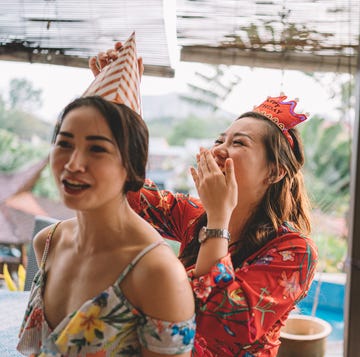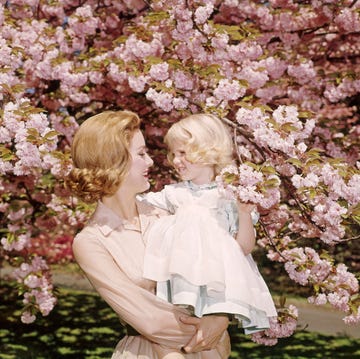There’s an empty space in my wedding photos, one that a stranger would never notice. It’s the space where my sister Jackie should have been standing. I have pictures with my other sisters, with cousins and aunts and people I will likely never see again. Jackie isn’t in the photos not because I didn’t love her, but because I asked her not to come despite my love for her.
Our relationship had become strained over nearly two decades as she suffered from alcohol addiction — a disease that would eventually kill her, in 2021. I had seen her unpredictable behavior at other weddings and past events. On top of that uncertainty, my mother had been diagnosed with Stage IV colon cancer five weeks before my wedding and Jackie had only gotten sober (again) a few weeks before the date.
Sadly, I’m far from the only person who’s faced the heartbreaking choice to exclude someone they love from an important event.
Approximately 2.6 million weddings took place in America in 2022, and more than a few of those happy couples likely had to tell a friend or family member that they couldn’t attend, not based on some petty grievance, but on things like alcohol or substance abuse issues, mental health struggles, a history of abusive behavior or a difference in belief systems that could cause tension at the event.
It's a hard choice, but a necessary one
For anyone who hasn’t had to make a similar decision, it might seem heartless to exclude a loved one from a big event like a wedding, family reunion or holiday gathering, but experts say it’s incredibly common.
“Most families have someone like this,” says psychologist Allison Moir Smith, whose company Emotionally Engaged specializes in helping couples with the sometimes unexpected feelings that come up when planning a wedding. That may include grieving the last days of your single life or facing “unfinished business” with family or friends. But knowing you’re not alone doesn’t take away the fear, guilt and shame that often comes with uninviting or not inviting someone you love.
I hated making the call to my sister. I explained as gently as I could my reasons for not having her there: I was scared she would become intoxicated and cause a scene to the point that I would have to have someone escort her out, which I’d seen happen before. I knew that in addition to the typical wedding day nerves, I would be full of anxiety about my mom who had just started chemotherapy. I couldn’t imagine also keeping one eye on my sister. Luckily, Jackie didn’t fight me when I told her how I felt.
“I get it,” she said when I explained my fears about her coming. “I want you to have a beautiful day and we can celebrate another time.”
Her sweetness and understanding made me feel even worse.
Others have made similarly tough choices
For Blake Turck, a writer in Manhattan, the decision to not invite someone to her wedding didn’t involve a calm conversation. Turck had been close friends with a woman she calls “R” for several years, but during the year leading up to Turck’s engagement and then her wedding, their friendship became increasingly toxic. R’s erratic behavior and bullying caused Turck not to invite R to her bachelorette, even though she had invited her to the wedding.
“Looking back, I’m not sure why I thought that would work,” Turck says.
When R found out about the bachelorette party, she ended up telling Turck she wouldn’t attend the wedding via a hostile text, just days before the event. That saved her a potentially awkward conversation, but Turck says she would have handled it differently today. “Maybe I would sit down and discuss it with her,” she says. “I guess I was inadvertently trying to protect myself.”
Olivia Auxier, a marketing executive based in Austin, Texas, didn’t invite her mom to her 2012 wedding in Maui. Her mother was deep in the throes of drug and alcohol addiction, and their relationship had been strained for years.
“I knew that inviting her would likely mean wondering how she would act or if she would try to confront me,” Auxier says. She could always tell if her mom was drinking, and she was highly attuned to any change in her voice. (She could even tell her mom was impaired by reading an email. “If you could slur your words digitally, then she did,” she says.)
Setting boundaries is healthy, and necessary
When a relationship causes anxiety or trauma, these sorts of triggers are everywhere.
“When making healthier choices for oneself and moving away from family dysfunction, may feel like pumping an atrophied muscle,” says Brooklyn-based LCSW Heather Coleman.“If you are struggling to set healthy boundaries with your family or friends, or saying no to them for your own well-being, I highly recommend sorting out your feelings with a professional in order to gain the support to take those courageous steps.”
Auxier had learned to put boundaries in place with her mom, and that meant not having her at the wedding, no matter what other people might think. She says that some extended family members were “curious” about her decision, but she never let their questions sway her or make her feel bad for doing something that she knew was best for her well-being.“I was able to be in the moment at my wedding,” she says.
Keeping her mom out of the picture made the weeks leading up to the event tougher as she envisioned the moments she would have loved to have her mom by her side, like getting ready or trying her dress on, but she didn’t second-guess herself during the big day itself.
“There is an incredible amount of guilt, or fear that you’ll regret it, but you can’t be more concerned about that person than they are about you,” Auxier says. “It’s OK to put yourself first.”
“The move to keep troublesome people away is always psychologically healthy,” agrees bestselling author and researcher Daniel Pink, whose most recent book, The Power of Regret, looks at the positive side of regrets. “Over time, what people regret more than anything else is what they didn’t do, rather than what they did.”
Pink calls making the decision to not invite someone to a big event, “an act of boldness.” It might not feel bold in the moment when you’re making that choice, but down the road, when you look back on memories that are free of anxiety and full of happy moments, it’s unlikely you’ll regret the decision.
When having the conversation, keep your needs in mind
If you’re estranged from someone, you might not need to have the tough conversation telling them why you think it’s best for them not to come to your event. But if you’re still in contact, like I was with my sister, you’ll probably have to pick up the phone or meet in person, communicate your feelings and let them know why you’re making this decision.
“The most important thing to keep in mind before having any difficult conversation is to know that you are well-intentioned,” says Coleman.
It’s essential to make your decision thoughtfully, instead of going on impulse, Moir Smith advises. “Do the imagination work of what it will be like to not have them there or have them there,” she says.
If you’re worried about broaching this conversation, Moir Smith says it’s best not to enlist a third party like another family member or friend, since that could make it seem like you’re ganging up on them. She says that if you go in expecting the conversation to get tense, you won’t be caught off guard when it does go south.
“I'd suggest putting a ‘pause’ on the conversation if and when it gets heated,” Moir Smith says. “Then ask to return to the topic in a day or two, and share further thoughts. This is not a one-and-done conversation.”
If you do decide to invite a person who might bring anxiety to a big event, have a plan for what to do if they act out. Maybe there is a designated person to walk them out if things get stressful, or maybe you put boundaries in place like not allowing them to give a speech, since that tends to be a time when even the most subdued weddings can go off the rails.
“Boundaries are so important for your mental health,” says Auxier.
On my wedding day, I thought about my sister often. I wanted her to be there, and in a perfect world, she would have been. That doesn’t mean I regret the tough decision I had to make, as hard as that is for me to admit. Not having her there meant I could be fully present. It was a beautiful event, one where I could focus on my husband, our friends, our families, and myself.
Dina Gachman is a Pulitzer Center grantee and her most recent book is So Sorry For Your Loss: How I Learned To Live With Grief, and Other Grave Concerns.












